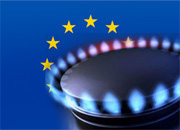More natural gas for Europe
Options
More natural gas for Europe
 "Politicians must finally recognize the value of natural gas as an environmentally friendly energy and promote it as a natural partner of renewable energies," Dr. Gerhard Konig, Chairman of WINGAS, explained to journalists in Brussels.
"Politicians must finally recognize the value of natural gas as an environmentally friendly energy and promote it as a natural partner of renewable energies," Dr. Gerhard Konig, Chairman of WINGAS, explained to journalists in Brussels."This requires a sustainable European energy policy from the new EU Commission," he added. In particular, Dr. Konig said it was necessary for policy-makers to prepare the political groundwork for an increased use of natural gas for electricity generation. Meanwhile, WINGAS, a joint venture of BASF subsidiary Wintershall and Russia's Gazprom, continues on its growth course in Europe. In Belgium, the company is supplying Russian natural gas to resellers for the first time and increased quantities to power plant operators. WINGAS has also expanded its sales activities to the Netherlands. Belgium and the Netherlands will also profit from an improved natural gas infrastructure in northern Germany and new storage facilities in the border region in future, in which WINGAS Group is planning to invest more than one billion euros.
Customers from Belgium and the Netherlands can store their natural gas with their neighbor in future. WINGAS is building a new cavern storage facility near the Dutch border in Jemgum in northern Germany which will be connected to the Dutch gas network via a 15-kilometer-long pipeline. Hence, in addition to the largest natural gas storage facility (capacity: 4.2 billion cubic meters) in Western Europe, in Rehden near Bremen, customers in Belgium and the Netherlands will have access to another flexible natural gas storage facility in future. The cavern storage facility in Jemgum will have a total capacity of 1.2 billion cubic meters.
In addition, in future Belgium and the Netherlands will have improved access to the gas reserves in Siberia thanks to the planned extension of the Nord Stream pipeline, through which Russian natural gas will be transported to the German Baltic Sea coast from 2011. Construction of the 470-kilometer-long OPAL pipeline link, which will run from the Baltic Sea coast to the Czech border, has already commenced. In the coming year, more than a billion euros has been earmarked for the construction of a new pipeline, the North European Gas Pipeline (NEL) - from the German Baltic Sea coast past Hamburg to Rehden in west Lower Saxony. There it is planned that the NEL pipeline, which is over 440 kilometers long, will be connected to Dutch company Gasunie's gas network, amongst others, thus supplying Western Europe with Russian natural gas.